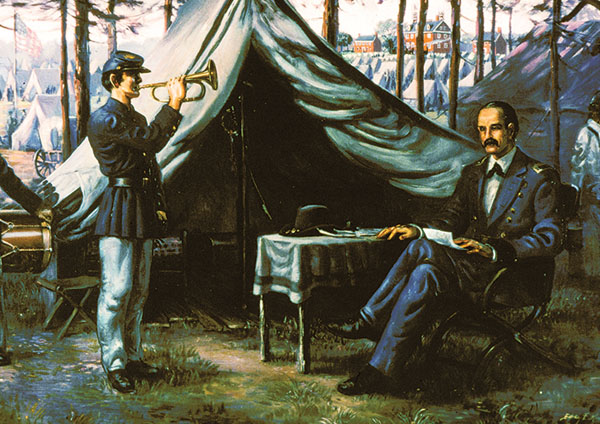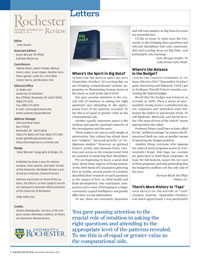Letters
Where’s the Spirit in Big Data?
Thanks for the article about Big Data (September-October). It’s exciting that we are bringing computational systems approaches to illuminating human issues at the macro as well as the micro level.
You gave passing attention to the crucial role of intuition in asking the right questions and attending to the appropriate level of the patterns revealed. To me this is of equal or greater value as the computational side.
Another equally important aspect is the wisdom and psycho-spiritual maturity of the investigators and the users.
These matters are not so easily taught at universities. Our culture has siloed them into “religion,” “personal growth,” or “indigenous studies.” However, as spiritual leaders, artists, and shamans know, intuition and access to the transpersonal field are essential in mastering their disciplines.
We are beginning to know a great deal more about these aspects of being human. At the 2008 Seeds of Compassion gathering here in Seattle, several panels of scientists described their research on such questions as the impact of love on child health and brain development. One conclusion: compassion and a sense of belonging to a larger community expand intelligence and greatly affect how we use information.
To me, these are extremely important and relevant matters as Big Data becomes our powerful tool.
I’d like to know in what ways the University is also bringing these questions and relevant disciplines into your commendable and exciting focus on Big Data—and particularly into teaching.
Anne Morgan Stadler ’52
Lake Forest Park, Wash.
Where’s the Balance in the Budget?
I found the insights expressed in “At Issue: Election 2012” (September-October) quite interesting and balanced. Until I got to Professor [David] Primo’s remarks concerning the federal budget.
Recall that the budget was balanced as recently as 2000. Then a series of spectacularly wrong moves (a misdirected tax cut, expensive and unfunded wars) ballooned the deficit to spectacular levels. To call Medicare, Medicaid, and Social Security “the main drivers of the deficit” seems spectacularly one-sided.
Professor Primo could have at least called for the “political courage” to remove the ill-conceived Bush tax cuts as another means of attacking the budget problem.
Another thing: everyone who laments the costs of social programs seems to (conveniently) forget that huge tax receipts are generated to fund these programs. At least, for full honesty, report the net costs of these programs, and stop pretending that the budgetary outflows are the only side of the story.
Norman Bloch ’66 (PhD)
Okatie, S.C.
 A painting by Sidney E. King at the Berkeley Plantation depicts the birth of “Taps.” (Photo: Berkeley Plantation)
A painting by Sidney E. King at the Berkeley Plantation depicts the birth of “Taps.” (Photo: Berkeley Plantation)There’s More History to ‘Taps’
Your article on the history of “Taps” (Alumni Gazette, September-October) was much appreciated. I was particularly interested because I spent several years, after arriving at Union College in 1988, re-establishing a geology department, in Butterfield Hall on the Union campus.
The building was a gift of the widow of Union Army Brigadier General Daniel Butterfield to his alma mater, and housed both civil engineering and the renascent geology department at that time. One of the first things I learned after arriving was the connection between General Butterfield and “Taps.” Butterfield was Hooker’s, then Meade’s, chief of staff in 1863. He was wounded at the Battle of Gettysburg, and he had an active military record during prior Civil War engagements.
The comments concerning the stylistic elements in the playing of “Taps” are well taken. They could equally well be applied to “performances” of our national anthem, though I very much doubt that will happen any time soon.
George Shaw ’67
Schenectady, N.Y.
The writer is a professor emeritus of geology at Union College.
A very interesting article on the origin of “Taps.” The event described took place on the Berkeley Plantation, aka Harrison’s Landing, on the north shore of the James River in Charles City County in Virginia, very near Hopewell and downstream from Richmond.
There is another first that took place there 233 years earlier on Dec. 4, 1619. That event was the first officially recorded thanksgiving service by English settlers in the American Colonies. The instructions given to the colonists by the English proprietors of the colony were:
“Wee ordaine that the day of our ships arrivall at the place assigned for plantacon in the land of Virginia shall be yearly and perpetually keept holy as a day of thanksgiving to almighty God.”
That observance occurred a year before the Pilgrims landed and two years before the Plymouth Thanksgiving.
Unfortunately, the Berkeley settlers were killed in an Indian uprising in 1622, and the tradition died with them. For the past 50 years that first thanksgiving has been celebrated at Berkeley Plantation on the first Saturday in November.
Woodlief Thomas ’58 (MS)
Naples, N.Y.
Department of Corrections
The cofounders of Western Union in Rochester were Hiram Sibley and Don Alonzo Watson, not James Watson, as you state in the caption on page 34 (“A Great Gift to the City,” September-October). The picture you show is Don Alonzo Watson, not his son James Sibley Watson.
Elizabeth Brayer
Rochester
The writer is the author of George Eastman: A Biography, originally published by the University of Rochester Press in 1996 and published this fall in a new paperback edition.
No doubt I am among the many to point out that the date (July 2, 1852) in the article on “Taps” is off by 10 years. Not for nothing did I receive an MA in American history from Rochester.
This was a good issue. I also liked the article “The Pilgrim” (Alumni Gazette) and, especially, “A Great Gift to the City.” I visited the Memorial Art Gallery many times and may now have to return someday.
Beverly Offen ’65 (MA)
Glenview, Ill.
Editor Scott Hauser writes: “Several readers caught our mistake in the date for the first playing of ‘Taps’ during the Civil War. The correct year is, of course, 1862. A late editing error—fuzzy math meets fuzzy history meets the fat fingers of a deadline—resulted in the mistake.”
Review welcomes letters and will print them as space permits. Letters may be edited for brevity and clarity. Unsigned letters cannot be used. Send letters to Rochester Review, 22 Wallis Hall, P.O. Box 270044, University of Rochester, Rochester, NY 14627-0044; rochrev@rochester.edu.

